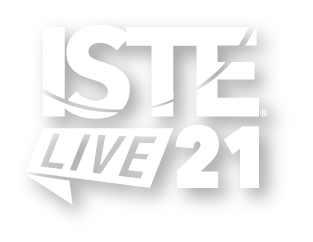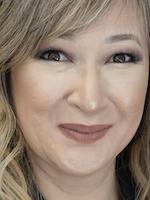

shIfTing Math Teaching & Learning for Modern Learners |
Listen and learn : Panel
Jennifer Chang Wathall Sandra Chow Kyle Pearce Dr. Mandi Tolen
Our modern learners are curious, self-directed, passion-driven and infused in a digital environment. Interact with this all-star panel as they dialogue, share and dig deep into mindsets, strategies, tips and ideas that educators can use to prepare our modern math learners for their future.
| Audience: | Coaches, Curriculum/district specialists, Teachers |
| Skill level: | Beginner |
| Attendee devices: | Devices required |
| Attendee device specification: | Smartphone: Android, iOS, Windows Laptop: Chromebook, Mac, PC Tablet: Android, iOS, Windows |
| Participant accounts, software and other materials: | Having a Google account would be helpful. |
| Topic: | Project-, problem- & challenge-based learning |
| Grade level: | PK-12 |
| Subject area: | Math |
| ISTE Standards: | For Educators: Designer
|
The Modern Learner is connected, socially-driven, and curious. With increasing accessibility of technology in classrooms through one-to-one or BYOD models, and the popularity of GSuite tools, educators need to SHIFT how they teach and students learn. But how does that translate into the Math classroom? How can we ensure that students are engaged in deep learning of problem solving strategies and Mathematical thinking?
In this session, we will showcase how technology has shifted mathematical learning in Modern Classrooms, and how our diverse Modern Learners can solve problems collaboratively, communicate their thinking, and receive feedback. Bringing together a diverse perspective of math educators, participants will gain an understanding of current trends and research in mathematics, hear innovative ideas to enhance math learning and glean tips and tricks for leveraging technology when teaching mathematics.
Pedagogy Highlights:
• SAMR Model (Dr. Ruben Puentedura) and consideration of technology integration in the Math Classroom
• Technology integration in a 3-Part Math Lesson (John Van de Walle)
• Communication through the Mathematics classroom (Gallery walk, Math Congress, Bansho)
• Student Collaboration in problem solving for student success
• Descriptive feedback through the use of technology
• Differentiated instruction and assessment to reach every student using technology
Defining our Modern Math Learner (10 min)
• Panelists will share their perspectives, but we will also draw upon the insights of participants using a data collection application.
Our Shifting Landscape (15 min)
• Performing a live SWOT (Strengths, Weaknesses, Opportunities, Threats) analysis, our panelists will share a picture of our current landscape in mathematics. The audience will have an opportunity to chime in with their ideas and thinking as we set the stage for how we might teach Mathematics in our current context.
Shifting our Practice and Learning (25 min)
• Panelists will share strategies, practices and ideas that we should consider when teaching math in our current context.
• Panelists will demonstrate tools, resources and practices that will bring your math teaching and learning to new levels.
• Participants will learn about various mediums for developing their Professional Learning Network.
• We will highlight Math Education blogs to follow, Twitterchats, hashtags, and other math educators you can glean from who are active on social media.
Closing, Reflection & Evaluation (10 min.)
• We will address additional questions from the audience and provide an opportunity for the audience to share their ideas and experiences.
• 10 Principles for Schools of Modern Learning - Will Richardson and Bruce Dixon
• Meeting the Needs of the Modern Learner: Technology Gains Its Footing, But It’s a Slippery Slope - Evan Sinar
• Why should a teacher use technology in his or her mathematics classroom? - https://education.ti.com/sites/UK/downloads/pdf/Research%20Notes%20-%20Technology%20in%20Class.pdf
• Using technology to support effective mathematics teaching and learning: What counts? -http://research.acer.edu.au/cgi/viewcontent.cgi?article=1067&context=research_conference
• The Three-Part Lesson in Mathematics Co-planning, Co-teaching and Supporting Student Learning - http://www.curriculum.org/secretariat/coplanning/files/CoPlanningGuide.pdf
• What are the benefits of virtual manipulatives? by @DreamBox_Learn - http://www.dreambox.com/blog/benefits-virtual-manipulatives
• Communication in the Classroom http://www.edu.gov.on.ca/eng/literacynumeracy/inspire/research/CBS_Communication_Mathematics.pdf
• Bansho (Board Writing): Collective Knowledge Production in Ontario Mathematics Classrooms - http://www.edu.gov.on.ca/eng/literacynumeracy/inspire/research/CBS_bansho.pdf
• Position of the National Council of Teachers of Mathematics - Strategic Use of Technology in Teaching and Learning Mathematics - https://www.nctm.org/Standards-and-Positions/Position-Statements/Strategic-Use-of-Technology-in-Teaching-and-Learning-Mathematics/
• What are the benefits of using technology for maths instruction? - Kristine Scharaldi, Education Consultant (Texthelp blog) - https://www.texthelp.com/en-gb/company/education-blog/march-2018/what-are-the-benefits-of-using-technology-for-math/
• Spiralling the Math Curriculum - Kyle Pearce, Math Consultant - https://tapintoteenminds.com/spiralling-guide/



Sandra Chow is Director of Digital & Innovative Learning at Keystone Academy, in Beijing, and is dedicated to preparing the next generation for their future. She has over 20 years of experience as an educator in Canada and internationally. She is an ISTE Certified Educator, Apple Distinguished Educator, Microsoft Innovative Educator Expert, and Google Certified Innovator and Trainer. Her experience as a professional accountant, a cross-cultural educator, and a networker provides her with a unique perspective as a leader. She strives to prepare students and train educators to learn, teach, collaborate and create in a globally competitive society.

Mandi Tolen is a high school math teacher, a technology leader, a Google Certified Innovator, a blogger, and the author of Make Math Not Suck, a guide for teachers to create fun and memorable math experiences for students. She loves to learn and share her knowledge with others. Mandi has a passion for changing how we teach to create thinkers and learners.